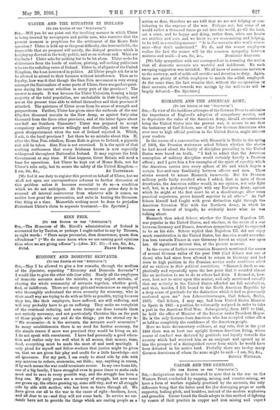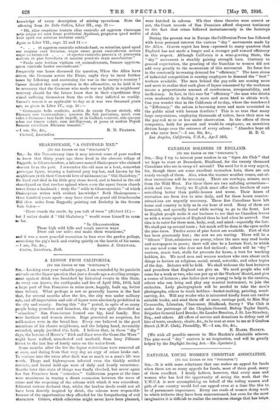CAESAR AND THE GERMANS.
[TO THE EDITOR 07 THE SPECTATOR."]
Srn,—Antiquarians may be interested to note that in the war on the Western Front, conducted by sapping, mining, and counter-mining, we have a form of warfare regularly practised by the ancients, tho only different:* being that the latter used fire (for destroying props or earth supports), boiling pitch, and boulders, instead of the modern explosive. and grenades. Caesar found the Gauls adopts in this method of fighting by reason of that practice in copper and iron mining and caper 0 knowledge of every description of mining operations. Note the (Mowing from De Reno Calico, Liber III., cap. 21 :-
" lfli, alias eruption tentata alias cuniculis ad aggerem vineasque actis (cujus rci Bunt long° peritissimi Aquitani, propterea quod multis locis apud eos aerariae sectume sunt)."
Again in Liber VII., cape 22 and 24 :- • . . . et aggerem cuniculis subtrahebant, eo scientius, quod spud eos magnao sunt fcrrariae, atque omno genus cunieulorum notum atque es:tatum est . . . et apertos cuniculos praeuala et pracacuta =eerie et pice fervefacta et maxima ponderis saxis morabantur."
• Paulo ante tertiam vigiliam est animadversum, f umare aggerem, quern cuniculo hostes succenderant."
frequently one hears discussed the question, When the Allies have driven the Germans across the Rhine, ought they to incur further basses by following and continuing the war in the enemy's country ? Caesar decided this very question in the affirmative, as he held it to be necessary that the Germans who made war so lightly in neighbours' territory should for the future know that in their expeditions they raked suffering themselves from the evils they inflicted so readily. Caesar's reason is as applicable to-day as it was two thousand years ago, as given in Liber 1V., cap. 10 :—
Germanic° hello confect°, multis de causis Caesar statuit, sibi Rhenum esse transeundum ; quarum illa fuit justiasima, quod, cum sidene Germanos tarn facile impelli, ut in Galliam venirent, suis quoque rebus e03 timere voluit, cum intelligerent, et posse et audere Populi Romani exereitum Rhenum transire."
Cartmcl, Lancashire.































 Previous page
Previous page